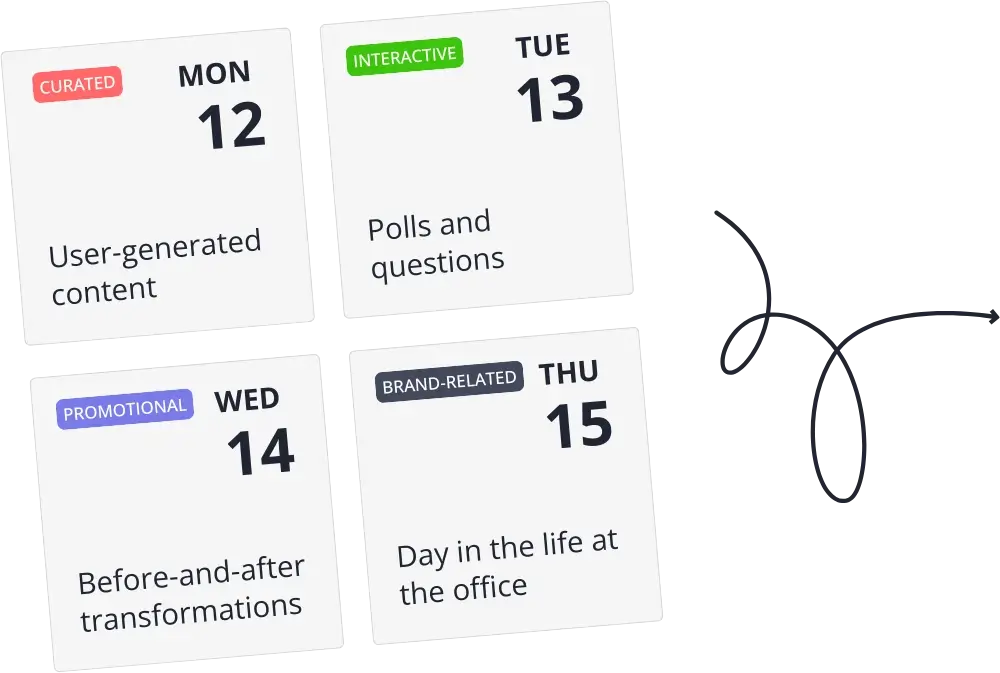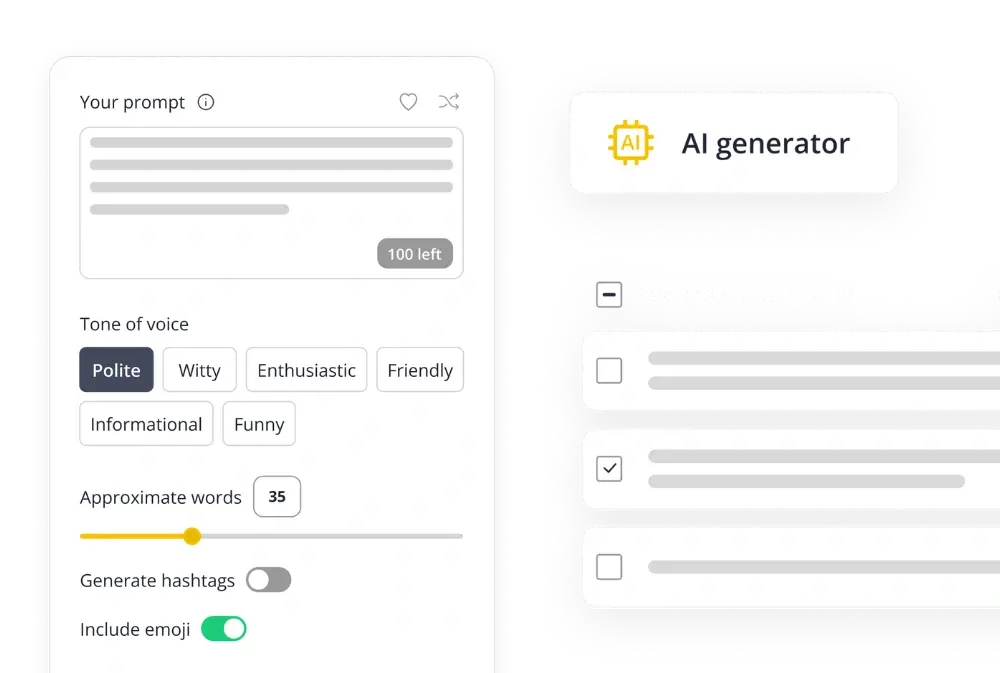What Is a Social Media Post?
Social media post definition
A social media post is a short-form type of content or message that gets published on social media platforms such as Facebook, Instagram, Twitter, LinkedIn, and other similar channels. It takes several different forms that result from mixing text, images, videos, links, and audio files.
Social media content basics
The social media community has a language of its own. It’s important to know what jargon-heavy terms mean in order to fully understand the social media world and become an active part of it.
We often hear the term “post.” For many people, especially the ones involved in the social media sphere, the meaning of this word is quite obvious.
A social post is a message published online by a user on a message board, comment section, or social network. A post can be your recent Instagram picture, a link to your blog post, or a simple comment. All in all, a post represents a piece of content that can easily be published across various social networks.
Keep in mind that not all content is relevant for every social networking site. It’s okay to share completely different posts on various platforms. This could even help you gain more engagement.
For example, if you compare Twitter content with Instagram content, you’ll find that the posts on each platform are completely different. While Twitter thrives on short-form written content, Instagram is more oriented toward visual content: images, videos, Reels, Stories, and carousels.
The lesson here? To increase your reach, engagement, and conversions through social media, you have to translate your message into formats that work best for every social channel.
Types of social media posts
Social posts come in many shapes and sizes. By combining different formats, media types, and topics, you can get multiple variations of social media content.
So how many categories of social media posts are out there? Too many to count, after all, the possibilities are endless. While we can’t list every post type out there, we can highlight the most popular ones.
Here are the main 10 types of social media posts:
- Text Posts: As the name implies, these types of posts only contain text and they are the most basic form of social media content.
- Image posts: Such posts can be exclusively made out of images or they can also contain short engaging captions that bring extra value to the visual.
- Video posts: Video social media posts are typically short and designed to engage viewers more than any content type. This content format has become increasingly popular and almost all social media networks have released features and feeds dedicated to video posts.
- Link posts: Link posts are great for driving traffic to web pages, such as articles or product pages. This type of content helps creators cross-promote their own web content or share curated posts from other sources (news, studies, industry news, etc.).
- Live streams: Live streams are an effective way to interact with followers in real-time. Creators can live stream events, demonstrations, and interviews, or they can simply go live to have a conversation and answer questions from their audience.
- Interactive content: Interactive posts are used to encourage interaction between social media accounts. They usually take the shape of questions, polls, quizzes, or other forms of posts that request the intervention of other users—contests and giveaways are also an example of interactive content.
- Memes: Memes are used to share funny thoughts and ideas and comment on pop culture events. For businesses, this content type is a way to humanize their brand and show off the fun side of their company.
- User-generated content: UGC is generated by consumers and acts as social proof for brands that want to post happy customers in order to generate more conversions.
- Promotional posts: Any type of content designed to promote a business or a specific product or service. Besides visuals and text, promotional posts can also contain links, CTAs, branded hashtags, and product tags.
- Educational posts: Social media provides a way for brands to educate their followers about topics relevant to their industry. These posts can take the form of infographics, tutorials, or instructional videos.
The benefits of posting social media content
Social media posts are an important part of any social media marketing strategy. They allow businesses to build a community around their brand and establish a meaningful presence in the online space.
Here are the main benefits of a consistent social media presence:
- Gain more brand awareness: Social media posts are a great way for increasing the online visibility of your business, helping you reach a wider segment of your potential customers.
- Boost engagement: Through social media posts, businesses can reach more people, engage with them, and build meaningful relationships through comments, messages, and helpful information.
- Generate leads: Social media posts allow businesses to generate leads by directing people to their product pages and other types of relevant content such as lead magnets (templates, guides, e-books, etc.).
- Increase website traffic: Linking to your website from your social media pages can help you drive more traffic and conversions.
Helpful tips for creating social media posts
If you’re just starting out with social media, there are some best practices you need to consider.
Here are the top five social media tips for businesses:
- Craft an attention-grabbing hook: Your first statement should be short and easy to understand, while also being intriguing enough to grab the reader’s attention.
- Customize your approach on each platform: Each social media platform has different sets of rules that influence post performance, such as character limit, image size, aspect ratio, and hashtag use.
- Make use of visual content: Images and videos are the content formats with the best performance. Try to post as much visual content as you can, especially video clips.
- Create interactive content: Ask questions, respond to comments and maintain a close relationship with your followers.
- Use social media analytics to inform your strategy: Track your content performance and gain valuable insights about what resonates with your target audience.
Frequently Asked Questions
How often you should post on social media depends on two main factors: the platform and your target audience. However, there is a general guideline you can follow to make sure you maintain a decent posting frequency, no matter the platform. It’s important to post between once a week and once a day.
For businesses or organizations, more frequent posts are typically better, as this will help keep your content fresh and relevant. It’s also important to consider the peak times of day or week when users are most likely to engage with your posts, in order to maximize the reach of each post.
Here are five effective ways to brainstorm social media post ideas:
- Use trending topics or hashtags as a way to research current topics.
- Stay up-to-date on industry news, and keep an eye out for interesting stories or conversations that you can leverage in your posts.
- Utilize social media listening tools to keep track of trending topics.
- Monitor your social media content performance and discover what type of posts your audience likes the most. Then use this information to expand on top-performing topics.
- Research your competitors and influencers from your industry and get inspired by their content ideas. Remember to make the content your own by enriching it with your personal takes, knowledge, and opinions.
Measuring the success of a social media strategy can vary depending on your goals. However, the most common metrics used to evaluate the effectiveness of a social media campaign are engagement rates, reach, sentiment analysis, website traffic, and conversions.
To gather these insights from your social media platforms you need to run dedicated business accounts for your company. Another way to monitor your content performance is to use social media analytics tools.
Recommended for you: Interactive Post Ideas You Need to Use on Social Media






